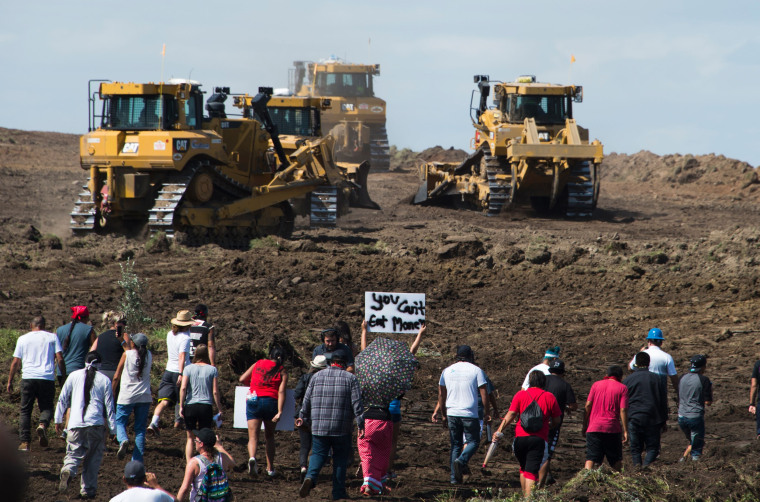Five of the nation's largest labor unions asked President Obama on Monday to "stand up for American workers" and allow construction of the controversial Dakota Access pipeline in North Dakota to continue.
The unions, which collectively represent 3.5 million workers, said the weeks-long halt in construction of the pipeline at Cannon Ball, North Dakota, had caused "hardships for thousands of families." The unions said 8,000 of their members are currently working on the $3.7 billion project.
"The intervention by the Departments of Justice, Interior, and the U.S. Army to indefinitely halt a project that is more than halfway constructed and has received state and federal approval raises serious concerns about the future of infrastructure development in America, and the livelihoods of our members," the group wrote in a one-page letter.
Related: Congress Members Send Letter Urging Obama to Stop Controversial Pipeline
The statement was co-signed by the presidents of the International Union of Operating Engineers, International Brotherhood of Teamsters, Laborers' International Union of North America, United Association and the International Brotherhood of Electrical Workers.
The fate of the 1,170-mile pipeline, which would transport 470,000 barrels of oil a day across four states, remains in limbo as the U.S. Army Corps of Engineers continues its review of a permit the agency granted to Energy Transfer Partners — the Dallas-based company funding the project — in a fast-track approval process in July.
Protests forced a halt in construction in late August after the Standing Rock Sioux tribe sued the Corps, which has jurisdiction over the land, arguing it did not adequately consult with them before granting Energy Transfer Partners the approval. The Army Corps of Engineers said it did not oppose the suspension.
An Energy Transfer Partners spokesperson declined to comment.
The letter disputed the tribe's claims that the pipeline would destroy lands where many of their ancestors are buried, citing an independent analysis by the State Historical Society of North Dakota. That organization's inspection, the letter claimed, "revealed no evidence of infractions or violations … with respect to human remains or significant sites.”
Related: Green Party's Jill Stein Charged in N. Dakota Pipeline Protest
The pipeline would come within a half-mile of the Standing Rock Sioux reservation, which straddles the North and South Dakota border.
The letter from union leaders was a direct rebuke to another sent by nearly two dozen members of Congress on Friday asking the White House to intervene and stop the project. Additionally, the timing of the unions' position just more than a month ahead of the general election could put the president and his allies in a politically awkward position to address both the Standing Rock Sioux's concerns and placate the demands of a core Democratic constituency still unhappy over the president's rejection of the Keystone Pipeline last year.
In a statement to NBC News, Standing Rock Sioux Chairman Dave Archambault II said the letter was not indicative of widespread labor unity on the issue. He noted that the two-million members of the Service Employees International Union, National Nurses United, the Amalgamated Transit Union, the American Postal Workers Union and the Communications Workers of America had all stated their support for the tribe.
"We stand together in peace and solidarity," Archambault told NBC News. "Because this pipeline threatens the lives of the more than 17 million people who rely on the Missouri River for their water."

